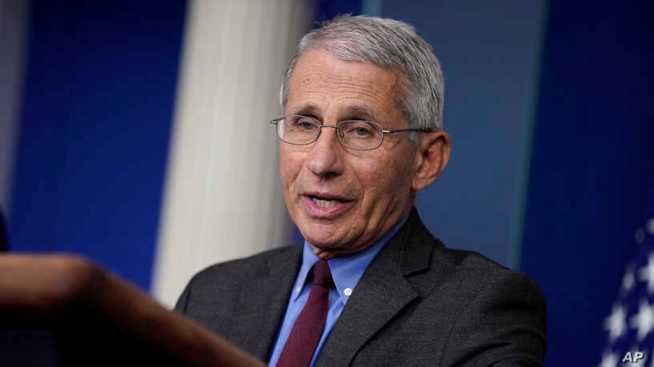Fauci: ‘Extraordinary Risk’ of Further COVID Spread If US Reopens Too Soon

Virus Outbreak Trump
VOA News By Ken Bredemeier
WASHINGTON – The top U.S. infectious disease expert, Dr. Anthony Fauci, warned Sunday there is an “extraordinary risk” of the further spread of the ravaging coronavirus if the United States is reopened to business and returned to a sense of normalcy too quickly on May 1, as President Donald Trump is considering.
Fauci told CNN, “It’s not going to be a light switch” to regenerate U.S. commerce as government recommendations for safe distancing between people end on April 30.
He held out hope that “at least in some ways” the country could return to work and routine day-to-day activities next month, but said it is likely to be different in various parts of the country.
That depends, he said, on the number of coronavirus cases in specific communities and whether testing has shown that large majorities of people are not infected.
Even with precautions, he said, “We know people will be getting infected. That’s just reality.”
The U.S. coronavirus death toll has topped 20,000, the highest total of any country, with more than 534,000 confirmed cases. Current U.S. models predict that 60,000 or more could die in the country by July.

Food and Drug Administration Commissioner Stephen Hahn told ABC’s «This Week» show, “The models do show that we are very close to the peak,” but cautioned, «This has been a really fast-moving outbreak, so we really have to take this day by day.»
As for the May 1 date, Hahn said, “It is a target and obviously we’re hopeful about that target, but I think it’s just too early to be able to tell that we see light at the end of the tunnel. I think it’s just too early for us to say whether May 1 is that date.”
A third expert also expressed the need for caution in reopening the country.
Dr. Christopher Murray, the director of the University of Washington’s Institute for Health Metrics and Evaluation, told CBS’s “Face the Nation” show that the number of coronavirus cases would increase again if the social distancing measures and closures were relaxed May 1.
«We don’t think the capability in the states exists yet to deal with that volume of cases and so by July or August we could be back in the same situation we are in now” if there was premature reopening of the country, Murray said.
Trump, mindful of the death toll and the fact that 17 million U.S. workers have lost their jobs in the last month, has said almost daily that he wants to reopen the country as soon as possible, with economic advisers pointing to the May 1 date as a target. But he says he will also listen to health experts on whether that is too soon.
He has called the choice between two imperatives – protecting the health of Americans and restarting the world’s largest economy — the biggest decision of his life.
Trump had originally called for reopening the country by Sunday, envisioning churches filled with worshippers on the Christian holy day of Easter. But he backed off as health experts, including Fauci, warned that reopening the country too quickly would lead to more coronavirus deaths.

Trump marked the day with a Twitter video message to U.S. Christians, wishing them a Happy Easter. But he noted how different the day would be nationwide, with most state governors ordering their residents to stay at home and Trump recommending that Americans practice physical distancing from others by at least two meters through the end of April.
“In many cases,” he said, “we’ll be separated physically only from our churches. We won’t be sitting near, next to each other, which we’d like to be, and soon will be again. But right now, we’re keeping separation; we’re getting rid of the plague. It’s a plague on our country like nobody’s ever seen.”
“But we’re winning the battle,” Trump said. “We’re winning the war. We’ll be back together in churches right next to each other. Celebrate, bring the family together like no other. We have a lot to be thankful for. Happy Easter everybody.”
Most U.S. churches kept their doors closed for Easter, but some defied state bans on large gatherings and held services.
Trump in January, February and half of March minimized the severity of the coronavirus threat after the first outbreak in China before declaring a national emergency. On several occasions, he said there were few cases in the U.S. and that the disease would quickly dwindle to nothing.

Some Trump advisers warned him of the advancing threat.
Fauci, director of the National Institute of Allergy and Infectious Diseases, said that “obviously” the country’s response could have been better.
“It would have been better if we had a head start,” he said. “Often the recommendation (of scientists and medical experts) is taken, sometimes it is not.”
He said the country’s high death toll “may have been a little bit better” if the U.S. had moved quicker toward social distancing and stay-at-home edicts.
Fauci said he hopes that the U.S. voters will be able to vote in person at polling stations on Nov. 3 in the U.S. presidential election between Trump and the Democratic candidate, former Vice President Joe Biden.
“I can’t guarantee it,” he said. “There’s always the possibility we could have a rebound” in a resurgence of the coronavirus.
But if so, he said, “Hopefully we would respond better.”

